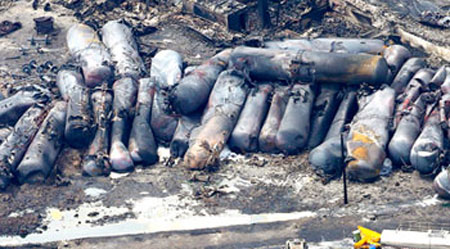MONTREAL — As organizing for the Oct. 11 mobilization for rail safety in Lac-Mégantic, Quebec, enters its final week, word is spreading about the Sept. 8 resolution passed unanimously by the City Council in Nantes placing the blame for the 2013 disaster on the Canadian government and the bosses of the Montreal, Maine and Atlantic Railroad. Nantes, just seven miles from Lac-Mégantic, is where the 72-car train carrying volatile crude oil was parked before it began to roll and then derailed and exploded, killing 47 people.
“The railroad catastrophe of July 6, 2013, in Lac-Mégantic was the result of several breaches and negligence by the MMA company, related to non-rigorous surveillance by Transport Canada relative to the application of its rail safety management policy in Canada,” the resolution says.
It points to the lack of government oversight of the rail company, the excessively worn tracks, the fact that the railroad’s current owner, the Central Maine and Quebec Railroad, has made “few serious and thorough repairs,” and the refusal of Transport Canada authorities to enact any new requirements for the rail bosses to carry out “preventive maintenance and immediate repair.” The resolution calls for immediate government action to meet “the right to complete safety in relation to the tracks” for people in the region.
The resolution was referred to the Congress of the Union of Quebec Municipalities Sept. 26, where the representatives of some 300 towns adopted it unanimously.
As a profit-raising cost-cutting measure, Transport Canada in 2012 under then Minister of Transport Denis Lebel approved Montreal, Maine and Atlantic’s request to run its trains, including those carrying crude oil from the Bakken shale fields in North Dakota to the Irving refinery in New Brunswick, with a “crew” of only one person.
To divert attention from its role in the disaster, the federal court in Quebec, with backing from the rail bosses, filed frame-up charges against Tom Harding, the train’s locomotive engineer, and train controller Richard Labrie, both members of Local 1976 of the United Steelworkers union. They each face 47 counts of criminal negligence causing death. Conviction could result in life imprisonment. Minor former company official Jean Demaître faces similar charges.
“The federal government is as guilty as the MMA for the disaster.” André Blais of the Citizens’ Coalition and Groups Committee for Rail Safety in Lac-Mégantic, one of the groups organizing the Oct. 11 protest, told the Militant. “Transport Canada let the MMA get away with not maintaining its tracks and equipment in safe condition.”
The weekly Écho de Frontenac published the Citizens’ Coalition release urging people across Quebec to participate in the protest, which is assembling at the Lac-Mégantic Sports Centre at 12:30 p.m. and marching at 1 p.m.
Labor and environmental groups in Chicago have called a rally outside the Canadian Consulate Oct. 12 at noon on the theme: “Bomb Trains. Show Solidarity with Quebec! We Could Be Next!”
As momentum for the Lac-Mégantic action builds, dangerous conditions on the railroads are becoming a growing issue in the Oct. 19 Canadian federal elections.
Protest organizers say the demonstrators plan to return to the Sports Arena to participate in a debate on the Lac-Mégantic disaster among federal candidates in the area, to demand they support safer conditions on the rails.
Harding has widespread support in Lac-Mégantic. After the derailment and explosion, he, along with a group of workers from the city, put themselves in harm’s way to uncouple some full oil cars still on the tracks and move them to prevent further explosions.
Government prosecutors are attempting to move his trial out of the area.
The Steelworkers union has set up a fund, www.justice4USWRailworkers.org, to help finance the two workers’ defense. A September 2014 union newsletter noted the widespread support in the area, saying people there “shared a widely held view that workers were being made scapegoats.”
Taking advantage of the ongoing federal election campaign, the Toronto-based Safe Rail Communities sent a questionnaire to the four main federal parties Aug. 31 on their policy on rail safety. The replies received to date from the Liberal, New Democratic and Green parties all complained about the current Conservative government budget cuts to Transport Canada. However, none raised the need for rail workers to win control over conditions on the job, or discussed the government-backed profit drive of the rail and oil bosses, or spoke out against the frame-up of the USW rail workers.
The candidates of the Communist League, Beverly Bernardo running in Montreal Papineau and Joseph Young in Calgary Skyview, have been distributing a statement demanding, “Drop the charges against Lac-Mégantic train engineer Tom Harding and train controller Richard Labrie now!” It explains why working people should join the fight against the frame-up of Harding and Labrie by the rail bosses and the government.
“We stand with working people in Lac-Mégantic who are demanding that Ottawa build a railway bypass around the town,” the statement says. “In addition we should fight to make it illegal for the railroads to operate without four-person crews” and demand “a maximum train length of 50.”
They are campaigning to build the Oct. 11 protest.
The immediate focus of the march is to demand the City Council get a court injunction to prevent the Central Maine and Quebec Railway from hauling dangerous goods until it repairs the unsafe track system through Lac-Mégantic.
The railway transports propane and other dangerous cargo and is expected to resume crude oil shipments sometime in early 2016. Most recently Central Maine and Quebec bosses refused a request by the City Council to repair a rusted-out culvert under its tracks.
For information or to send letters of solidarity to the October 11 march contact: infosecurail154@gmail.com.
Related articles:
Steelworkers picket ArcelorMittal mills protesting bosses’ cutback demands
VW scandal: Bosses junk safety in drive for profits
On the Picket Line
Deaths on the job rise as union membership falls
|
Printer-friendly version of this article |
















